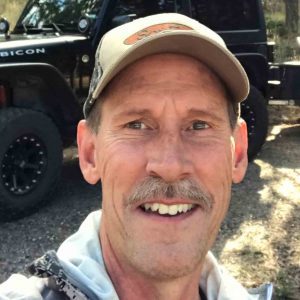How to Save a Life
One man’s story of facing the wilderness of prostate cancer.

A recent experience helped me learn more about how to save a life—the lives of other men and my own life, too.
My wife and I live on a 95-acre ranch near Estes Park, Colorado, which is the gateway to Rocky Mountain National Park.
We love the breathtaking scenery and I enjoy outdoor adventures like hiking, archery elk hunting, and backcountry skiing. We live a very abundant daily experience.
I often say that in life you make certain pivotal decisions that set the trajectory of your life. This was true for how we ended up living the rural lifestyle, but it also became true with the decisions I had to make with prostate cancer.
Proximity to cancer
Several members of my family have had cancer, including my mom, my mother-in-law, and later my wife, Pam, too. Also, my grandpa died from prostate cancer and my dad passed away from mesothelioma.
My reaction to cancer was that it was a difficulty of life that sometimes happens to people. Yet, I didn’t anticipate it would ever be a part of my story.

Increasing concerns
In my mid 40s, I started getting annual PSA blood tests, knowing that the presence of Prostate Specific Antigen can be an indication of prostate cancer.
In 2016, I noticed my PSA had climbed to 3.77, and thought maybe I should see a urologist as doctors say that a number of 4 or higher is concerning. I was busy in a new job as a civil engineer and so I brushed it off.
When I retested again in 2017, my PSA rose to 4.4, but I was right in the middle of leading a big work project, so I put it off again.
When I took another test in 2018, the number had now jumped to 5.7.
That got my attention.
Official news
I went to a urologist who collected biopsy samples and told me I had prostate cancer.
I was shocked.
I just can’t believe that I have cancer, I remember thinking. I’m only 58 years old!
Questions and isolation
I felt helpless and faced a flurry of questions like, How serious is this? What are my treatment options?
I dove into the medical literature, seeking knowledge and understanding. I learned how prostate cancer and treatment can affect a man’s fertility, reproductive tract and digestive tract.
I wanted to find some other men to compare notes with, but these are sensitive and private topics that no man likes to endure—and especially no man likes to talk about.
How I found hope, strength and peace
I grew up in a Christian family, and I believe God is the source of hope that transcends my circumstances.
With prostate cancer, I couldn’t control the situation, but I knew that God is in control.
In the Bible, God says that all things work together for the good of those who love him.
Through the roller coaster of the emotions and thoughts of prostate cancer, I found stability and comfort in the truth that God is inherently good, I am his living creation, and there is a redemptive purpose underlying the heartache and discouragement.
I was also found hope in the fact that prostate cancer, especially when caught early, does not have to be a death sentence for most men.
Taking action
After talking more with my doctor, I learned that a prostatectomy, or removal of the prostate, was the recommended treatment for my stage of prostate cancer.
Though I was reluctant, I booked the surgery for the summer of 2018. My big concern was scheduling it with enough recovery time so I could go bow hunting for elk in the fall.
After the surgery, my doctor said the pathology report revealed my margins were clean.
I was like, hallelujah! They got it all! I was relieved, believing this battle was over.
Early detection is your friend
I was so thankful about my outcome, that I became evangelical about the value of early detection with other men.
I shared with my friends and coworkers, including a work colleague who was about my age.
He called me back a few months later and said, “Greg, you saved my life.”
I said, “Oh, come on. Really?”
Because of our conversation, he later discovered he had a very advanced prostate cancer and his doctor said if not addressed, he would have died soon.
I was so thankful that at least one person benefited from my story.
An unexpected turn
After three years of follow-up PSA testing detected no evidence of cancer, I quit giving prostate cancer much thought.
That all changed last December when my annual blood screening came back with a detectable PSA level. I thought it was a lab testing error.
A retest confirmed my reality: I still had prostate cancer post-surgery, as the evidence indicates malignant cells had escaped the prostate prior to surgery. It was there all along, silently growing.
Now I had to wrestle with what to do about it.
With prostate cancer, my grandpa took the “que sera sera” approach, meaning “whatever will be will be,” and he did not pursue treatment and later died from it.
For me, I have a responsibility to Pam and my two kids. I want to be involved in their lives for years to come. And, so I am pursuing more treatment, including the gold standard of hormone therapy coupled with radiation.
When my doctor commented that this is my second and final chance for a cure—I accepted the dreaded side-effects and seized the opportunity to drive a spike through the heart of the beast.
I am still very much in the journey, but I have a lot of confidence and hope in the outcome.

Advice for others
These days, I continue to tell other men to take the risk of prostate cancer seriously. Get an annual physical and blood screening that includes the PSA test.
Early detection and treatment matter. The journey is very different if you deal with it earlier rather than later. You owe it to yourself and your loved ones to pay attention to this.
I also tell other men about the importance of faith. We all must believe in something, whether that is in yourself, your doctor, other people, or a loving Creator. For me, I trust that God will take care of me. Other men can find this source of strength and confidence, too.
As part of that, I believe that God uses doctors to help men deal with cancer and even cure it.
That’s why we need to take prostate cancer seriously and get annual screenings.
Taking action saved my life, and it also helped save the life of another man.
It may save your life, too.
For more about how to find spiritual hope, see Knowing God Personally.
For how spiritual hope can help you on your journey, see God’s Help in Cancer.
For help with fear, see Fighting the Fear of Cancer.
I have a question or comment
How to find God’s hope, strength and peace

